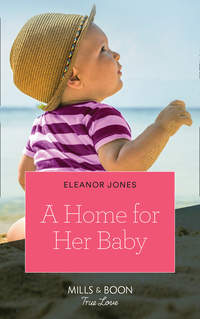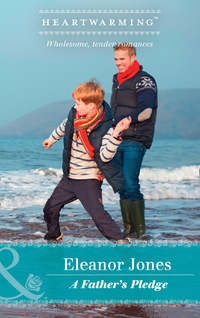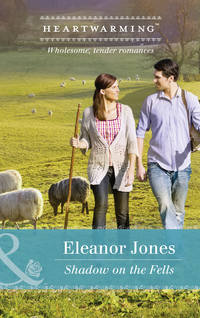
Полная версия
Footprints in the Sand
She sighed again and gazed out the window. At the moment, unfortunately, the security of Appletree House itself hung in the balance. Funding was changing and the modern consensus was to move children into more family-oriented environments, such as foster homes. But many of the kids at Appletree were from difficult backgrounds, and they needed more expert care. In Martha’s opinion, institutions such as hers fit the bill perfectly, combining the discipline of school with a secure home environment and professional care. Then there were children such as Bryn—well-adjusted, loving kids who’d come to Appletree because they had no one to take care of them. He might have benefited from being placed in foster care at first, but Appletree was his home now. And he was growing into a normal, caring, intelligent young man with a promising future ahead of him.
Martha looked out over the garden she’d grown to love so much. There had been talk of closing the school down altogether. It shouldn’t really affect her, of course, for she was retiring soon, but the large gray stone house had become a home to her over the past ten years, and she felt a huge responsibility to the children in her care. She closed the file, feeling unusually dispirited. In a way, she supposed, she was not unlike those children. Perhaps she, too, needed the discipline and security of Appletree.
* * *
BRYN HEARD THE TEA GONG boom as he whizzed through the air, perched on a bar at the end of a thick brown rope. He threw back his head to feel the wind in his face one last time, then pulled at the rope to slow it down, remembering that the new kid was coming this afternoon. He was on the ground before it stopped, stumbling to keep his feet, then racing across the front lawn toward the curved stone steps, taking them two at a time. The heavy oak door was already open, and children were wandering in from the garden, laughing and giggling and messing around.
“Hiya, Bryn,” gurgled little Kelly Watts. He ruffled her short dark hair and grinned.
“Hiya, Kelly.”
* * *
“ORDER!” MRS. DIBBLE YELLED, and they quickly organized themselves into a line, filing through to wash their hands and tidy up for tea, feet clomping on the shiny wooden floor.
Martha Dibble stood, as usual, in the hallway, watching them pass through with all-seeing eyes. God help a child who attempted to enter the dining room with grubby hands or untidy clothes—Bryn was probably the worst—and the most likely to get away with it. No matter how much he combed his floppy black hair, it always looked tangled, and his face, darkly tanned from a summer of sunshine, seemed to attract dirt like metal to a magnet. He spit on his hands and rubbed his cheeks as he approached the door, probably the only child in the room deliberately trying to catch Martha’s steely glare. She peered at him through her dark-rimmed glasses. He grinned, his brown eyes glowing, and despite herself, she smiled back.
Martha always liked to wait until everyone was seated around their tables before introducing a new arrival at Appletree. She firmly believed that the very act of sitting down and eating together with their future companions would make them feel more immediately at home.
* * *
BRYN TOYED WITH HIS FOOD, making patterns in his mashed potatoes, one eye fixed on the door. Lots of the children who came to Appletree were emotionally disturbed—at least they were if that meant they cried a lot—so maybe this kid wouldn’t be so bad, after all. He cut off a bit of sausage, dipped it in sauce and popped it into his mouth, biting into its hot tasty center. Hostile, though, now that was another matter.
But as soon as he saw her, Bryn realized why all those words had been used to describe her. She was only five or six, but her whole being bristled with ferocity. Mrs. Dibble held her arm, and her tight expression showed just how much trouble the little girl must have caused.
“Stay still, dear,” she said sternly as the child tried to wriggle from her grasp. The new arrival ignored her, snarling like a lion cub, and Bryn’s heart turned over. He could feel her unhappiness, her anger.
“This is Elsa May Malone, children,” Mrs. Dibble announced with a forced smile. “I hope that you will all make her feel very welcome.”
“It’ll take more than us to make her feel welcome,” Timmy Platt giggled. He was a chubby, spotty-faced boy who’d been at Appletree for about six months.
Bryn scowled at Timmy and stepped determinedly forward.
“Hello,” he said. “I’m Bryn.”
Mrs. Dibble smiled gratefully and beckoned him forward, but the little girl glowered at him with such malice that he froze. Her fierce amber eyes, sparkling with green and gold, stared out at him defiantly, her delicate face framed by a curly cloud of sun-bleached brown hair. She really did look like a lion cub, he decided, trapped and frightened, fighting for her life.
“I’m Bryn,” he repeated.
She scowled, poising herself to run.
“Oh, no, you don’t,” Mrs. Dibble scolded, grabbing her arm again. The little girl twisted and turned, then stood still, bristling with anger at the entire universe.
“We have ice cream,” Bryn said, holding out his hand. She clasped hers tightly together against her chest, defying him to come closer.
“Come on,” he urged. “You can sit next to me.”
Martha Dibble looked on in amazement as Elsa followed Bryn to their table, drawing her chair very close to his as if to shut out everyone else in the room.
“It was as though they made some kind of instant connection,” Martha later told the social worker, reflecting on the moment when the openhearted little boy had somehow managed to get through to a child who had been branded totally uncommunicative by all the experts in child welfare.
The Appletree staff had been warned that Elsa was emotionally unstable, having been deeply traumatized by her father’s death. Her stay at Appletree was supposed to be a brief stopgap between the foster home that had been unable to deal with her and a unit that would provide more specialized care. After Elsa’s interaction with Bryn, however, Martha managed to persuade Social Services to rethink their plan, insisting that the girl should be allowed to stay for at least a little longer.
Before she met Bryn, Elsa had been pronounced a danger to herself, snarling and refusing to eat, or just sitting in a corner staring into space, but from the moment she followed the dark-haired, warmhearted boy across the dining room to sit at his side and eat ice cream, everything changed. She still rarely spoke, only when absolutely necessary, but she followed Bryn Evans like a shadow, keeping to herself, watching him play and dutifully doing her schoolwork.
He talked to her all the time, telling her anything that came into his head, from the feelings he’d gone through when both his parents were killed in a car crash to his love of drawing and painting and his longing for a dog of his own. It seemed as if she knew every little thing about him, but let out nothing of herself. He didn’t know where she was from, why she came to Appletree or even her likes and dislikes. But somehow none of that mattered to him as long as she was there. The feelings she had raised in him all those months ago, when he first saw her in the dining room, were still as strong as ever.
She was just his Elsa, no more or less than that. Now and forever.
CHAPTER SIX
BEFORE I CAME TO APPLETREE, first there was my dad’s funeral. Mr. and Mrs. Mac didn’t go and I stood beside Ted, holding on very tightly to his hand. Victoria stood on his other side, rigid and still. There wasn’t much singing and my dad’s coffin didn’t have shiny brass handles like Daffyd’s. I hoped he didn’t look like Daffyd, swollen and gray, and I cried because he wasn’t an angel after all.
That was the last time I cried because my crossness came to soak up the tears. Being angry felt better than being sad, so I clung to it as tightly as I could.
I knew they were going to send me away. Victoria wouldn’t let me stay with Ted, and Mr. and Mrs. Mac didn’t like me anymore, so a lady came from somewhere called the authorities. Her name was Susan and she had very shiny hair. I didn’t like her much, but then again I didn’t like anyone anymore, so I just stopped talking and tried to build a wall around me.
* * *
I DON’T REMEMBER MUCH about the first place they sent me to. There was a tall smiley man, who tried to be nice, but I wouldn’t talk to him. And a big boy who pinched me when no one could see, but he couldn’t make me cry. And then they sent me somewhere else. “Somewhere better equipped to deal with you,” Susan said.
She came for me. I dug in my heels and refused to go, but the tall man picked me up and put me in Sarah’s car. She kept talking to me on the drive, but I stared out the window, wishing and wishing that everything could be like it used to. Oh, why couldn’t my dad have been an angel?
* * *
A LADY WITH GRAY HAIR and gray eyes dragged me through a hallway. I stomped on the wooden floor. I liked the sound, so I stomped even harder.
“Shush, child,” she said. “We don’t like rowdy children here.”
There were lots of tables and a sea of faces all staring at me, smiling and whispering. I wanted to go home so much, home to how things used to be.
“This, children,” announced the gray lady, “is Elsa May Malone. I hope you will all make her very welcome.”
I knew they wouldn’t. No one made me welcome anymore, for no one liked me. I closed my eyes and searched for my lump of crossness, the anger that kept any other emotion away. I didn’t care... I didn’t care... I didn’t care. When I opened them again, a boy stood in front of me. His eyes were very warm and he smiled at me.
“I’m Bryn,” he said.
I turned to run away but the gray lady grabbed my arm.
He repeated his name, holding out his hand. It was slim and brown and he held it very straight. I wanted to take it but my crossness wouldn’t let me, so I pulled away, clutching my hands tightly against my chest.
“We have ice cream,” he said, turning away. “You can sit next to me.”
The boy’s words went around and around inside my head. I had somewhere to sit, someone who wanted me to sit with him. I followed him slowly, clinging to him like a shadow. Everyone smiled at him, even the gray lady they called Mrs. Dibble, and I sat right beside him and ate ice cream. Here, I decided, is where I’m going to stay.
* * *
BRYN NEVER ASKED ME anything about myself.
“You can tell me when you’re ready, Emm,” he told me. He always called me Emm because of my initials, Elsa May Malone.
I had always wanted a dog, and we often talked about that.
“We’ll have a big yellow one like this,” he promised, showing me some pictures he had printed off the computer—Bryn was good at working the computer. “When we’re all grown-up, we’ll have a golden retriever.”
I nodded, smiling for the first time in ages because Bryn still wanted to be with me when we were grown-ups, and because we were going to get a dog.
My crossness faded just a little, and I decided to follow him always. I was scared, though, because Bryn didn’t know that everyone close to me eventually changed into something horrid. I didn’t want my Bryn to change and I couldn’t tell him about my fears. Perhaps if I didn’t let him all the way into my life, if he didn’t know me well enough, then he would stay the same.
At Appletree we were all in the same class, from five-year-olds right up to the big kids who would soon be moving on. I wanted to know where they moved on to, but I didn’t ask.
Bryn was nine years old; he had his birthday the day after I came to Appletree. So would he move on soon? I wondered. The thought ate at me like a disease, filling my dreams. If only I could ask him. I tried, I really tried, but the anger inside me got in the way of my tongue. When the social worker tried to make me talk, sometimes my words came out in a scream. But I never screamed when Bryn was there. He was my friend. My friend. I hugged that thought close to me, even though I knew we could never be proper friends. So I just listened to the things he said, hardly ever responding but hanging on to his every word so I could remember them later when I was alone in my bed.
He looked at me sometimes with a hurt expression, but I knew holding back was the only way to keep things as they were. It was all a waste of time, though, for eventually it wasn’t Bryn who changed, but my whole world.
* * *
MRS. DIBBLE CALLED US to the dining room midmorning. We were in class, and Bryn was helping me cut out pictures from the computer and stick them in a book. The heading on the front of it was Things I Love, but the only pictures I wanted to put in it were of dogs. Dogs loved you but never asked questions, Bryn said, and nothing in my life was more certain than the fact that one day I would have a dog of my own. Bryn felt the same way. And he wanted the same dog as me.
“Children!”
Mrs. Dibble banged on the table with a spoon and we all looked up.
“Into the dining room now, please.”
We filed through cautiously, aware of the strained look on her gray face and the faint tremble in her high-pitched voice.
When she told us, when she made the announcement that was to change all our lives, I felt sick. For the first time ever I broke my own rule, taking hold of Bryn’s hand and curling my fingers around his. He held them very tightly as the news sank in. Appletree House was shutting down, and we would all be moving on to new places. But we mustn’t worry, Mrs. Dibble said. They would be very nice homes.
Where was my anger? I searched my soul for it, but all I could find was sorrow. Suddenly, out of the blue, my world was tumbling down yet again. Was it my fault, then? Was it because I had grown to like this place?
I didn’t want to face the idea that we would have to be parted, so I tried to imagine us moving on together, all the children from Appletree House, and even Mrs. Dibble.
I had come to rely on the gray lady’s firm rule. “Harsh but fair,” Bryn said, and that was true enough. At least it had been until now. There was nothing fair about taking away our home. Bryn stuck up for her, though. He said it wasn’t her fault. He must have been right, for on that last morning she looked like a ghost who had lost its way. She walked quickly out of the room as soon as she’d spoken to us. I can’t remember what she said.
Susan, the social worker with the shiny straight hair, stood at the end of the long dining room, right where I’d stood all those months ago. She had a clipboard in her hand—Susan liked carrying clipboards. I think it made her feel important. Mrs. Dibble didn’t need anything to make her feel that way.
“These are unfortunate circumstances, children,” Susan told us. “I have the unenviable task of informing you all where you’ll be moving and I want you to know that we’re all trying to do our very best for you.”
I felt Bryn quiver beside me. I wanted to take hold of his hand again, but I didn’t.
“Billy Sharp, you—” she squinted at her clipboard “—will go to Long Meadows. It’s a nice family house near Lancaster, a place for older children. Four of you are moving there.”
She glanced at her clipboard again.
“Ashley Gibb, Tom Bradley and...”
My heart wrenched, sensing something bad that I was still unaware of.
“The fourth lucky child going to such a nice place will be...” She looked straight at me.
“Bryn Evans.”
All the anger inside me that had faded over the past two years came rushing back. My fingers found Bryn’s again and held on so tightly that no one would ever be able to pull them away. But of course they did.
I don’t remember much about the day after that. I don’t remember Susan telling me where I was going because, without Bryn, I didn’t care. When he was driven away in a big blue car with the three other children, I thought I would probably die. I wanted to die so much, just close my eyes and join my father and Daffyd in whatever place they were.
Bryn’s face was pressed against the window. I think he was crying, but I couldn’t cry. I watched until the car became a pale blur in the distance and then disappeared altogether, and I wrapped my arms around myself, desperately searching for the familiar crossness that fought off my pain and loneliness.
“Come on, Elsa.” That was Mrs. Dibble’s voice. I didn’t need to look at her to know she was choking on her tears. “Be strong. There’s nothing any of us can do to stop this. Life goes on, no matter what we do.”
Her interruption stopped me from going over the edge and being like I used to be when I first came to Appletree. Instead I just became hollow and empty inside.
* * *
I DIDN’T TAKE MUCH NOTICE of the place they sent me to at first. There was a small plump woman named Helen with curly hair and kind eyes—she tried to be friends with me but I didn’t let her. One thing she told me sank in, though. She must have known how much I liked Bryn because she talked to me about him.
“You needed to be in our small unit, here at Braymore,” she said gently, touching my hand. I pulled it sharply away.
“And the older ones had to go into a different environment.”
I stared at my shoes.
“Now you have two choices....”
I started to hum.
“Either you can be reclusive and difficult, like you were when you first went to Appletree, or you can stay quiet, keep to yourself, but watch and learn. Then, one day, when you’re older and you meet your friend again—as you surely will if you’re really so fond of each other—you’ll have become a bright, intelligent girl, one he will be proud to know.”
That may have been one of the most important things anyone ever said to me. From that day on, I focused my every thought on making Bryn proud. I remained aloof from the other children, unapproachable, locked in my own private world, and my insecurities still plagued me, but I learned and thrived and waited for the day Bryn would see the new me.
* * *
I WAS TWELVE YEARS OLD WHEN they moved me again, and to my own surprise, I felt sorry to leave Braymore. I hadn’t noticed the austere stone house with its small paned windows becoming a home to me, but it truly felt as if I was leaving home on the morning that I stood in the dark hallway with my battered suitcase.
I felt fear deep inside, fear of an unknown future, and the hard knot that I used to call my crossness pressed against my rib cage. It was strange to feel that raw anger again, the fierce, painful lump that made me want to strike out at the rest of the world. Strange and terrifying, for I knew it could still take me over if I let it.
Helen took my face between her palms.
“Good luck, Elsa,” she said. “I hope you’ll find your friend again. And he will be proud of you, believe me.”
That was one of the golden moments in my life. For the first time I could make someone proud, and now all I had to do was find him. In the end, it was easier than I thought.
I stepped into the social worker’s long red car and sat with my suitcase on my knees.
Dermot, the young man who had taken Susan’s place, grinned at me.
“Don’t look so worried,” he said. “The place you’re going is very nice, and you’ll settle in soon.”
I wanted to ask why they hadn’t let me stay at Braymore, but as usual, my mouth dried up and the words wouldn’t come. He answered my unasked question anyway.
“You’re too old to be at Braymore now. It’s for younger children. At the new home you’ll be able to take your school exams and even go on to college if you want. The world is your oyster, Elsa May Malone.”
It didn’t feel like an oyster, it felt like a gloppy pudding with no sides and no form.
The new home was modern, white and stark. I thought it looked cold and unwelcoming after Braymore, and I held the handle of my suitcase so tightly that my hand hurt. I wanted it to hurt, for it filled the emptiness inside me and stopped the anger from coming back. I had to keep the crossness away if I wanted to make Bryn proud. He wouldn’t like a girl who screamed with anger at the whole wide world.
There were children playing on a green lawn beside the house. They laughed and shouted and ran, throwing balls to each other and swinging very high from a huge old tree. Two girls sat side by side, writing in blue exercise books and giggling. They glanced at me and glanced away as if I was invisible. I was so alone and afraid that the breath became stuck in my chest and dizziness clouded my vision.
Then I heard a familiar voice, the dear familiar voice that had haunted my dreams for so long.
CHAPTER SEVEN
WHEN BRYN FIRST ARRIVED at Long Meadows, he didn’t want to like it there. He wanted to stay safe in the familiarity of Appletree, with Mrs. Dibble and all his friends—especially Elsa.
Elsa. She preyed on his mind all the time. Ever since that first day at Appletree, when she’d stood there in front of him, a snarling, spitting lion cub, he had somehow felt she was his responsibility. It was up to him to help her overcome whatever demons drove her into the sad and lonely space that no one else could enter. And he had come so close to getting there. The day before Mrs. Dibble announced that Appletree would be closing, Elsa had started to talk to him—real words, not just her usual “yes” or “no.” She had even begun to tell him about a place she loved, Jenny Brown’s Bay, named after a woman who’d lived there hundreds of years ago. It had taken more than two years for Elsa to really trust him, and then they’d been torn apart. She would probably end up just like she was when he first saw her in the dining hall at Appletree.
Tears welled in his eyes and he tightened his fists. Boys didn’t cry; his father had taught him that. Boys faced up to their responsibilities. As the car slid to a halt, memories of his father came back to him—a tall, strict imposing, man. And his mother...his mother was a dreamer, an artist who lived in an airy-fairy world. She had dark hair and eyes, like him, and was slightly built. Was he a dreamer, too?
The car door opened and the sun streamed in, sun that would stay with Bryn for his entire time at Long Meadows, even when the rain came down.
The building was white and freshly painted, with wooden window frames and a deep green front door. It opened as the children approached, revealing a plump, motherly woman with the biggest smile Bryn had ever seen.
“Hello, children,” she welcomed them. “Lunch is ready. After that I’ll get someone to show you around.”
Her voice held the soft lilt of Wales, Bryn’s home country. It made him feel comfortable and more relaxed than he’d been since they’d dragged Elsa away from him. She’d looked so dejected as they drove off, a small, lonely figure with none of her fierceness showing at all. What would happen to her now? What would she do without him?
“Come on, Bryn,” urged Billy Sharp, patting him on the back. “Stop mooning over that crazy Elsa, you’re well rid of her anyway. Let’s go see our new home.”
“He’s right, you know,” added Ashley.
She looked at him with a knowing expression, gazing down from her lofty height. He suddenly felt uncomfortable under her close scrutiny.
“But she doesn’t have anyone else,” he mumbled. “And she’s not crazy, she’s scared.”
“We’re all scared, but we don’t act like her,” Ashley said, an angry edge in her voice.
Billy pulled a face. “You’re just jealous, Ash.”
“Now really, children.”
The plump lady scowled at them, revealing a hidden glimpse of steel.
All four children spoke in unison. “Sorry, Mrs....”
“Evans,” she finished. “Where are your manners? We don’t put up with bickering at Long Meadows.”
“My name is Evans, too,” Bryn chirped, and she smiled again, placing a hand on his head.
“Bryn Evans, I believe,” she said, surveying the four pairs of eyes that stared cautiously back at her. “And you three must be Ashley, Tom and Billy. Now tell me which of you is which.”








